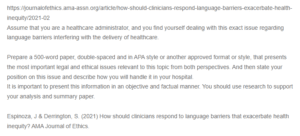Language Barriers in Healthcare
Language barriers pose significant challenges in the delivery of healthcare services, often leading to miscommunication, compromised patient safety, and limited access to quality care. As a healthcare administrator, addressing this issue requires a comprehensive understanding of the legal and ethical dimensions surrounding language barriers in healthcare. This paper aims to analyze the most important legal and ethical issues related to language barriers, present both perspectives and conclude with a recommended approach to address this issue in a hospital setting.
Important Legal and Ethical Issues Relevant to Language Barriers in Healthcare
From a legal standpoint, healthcare administrators must navigate several key issues related to language barriers in healthcare. Firstly, Title VI of the Civil Rights Act of 1964 imposes an obligation on healthcare providers to offer language assistance services to individuals with limited English proficiency. Failure to comply with this requirement may result in the loss of federal funding. Secondly, the Americans with Disabilities Act (ADA) mandates the provision of effective communication as a reasonable accommodation for individuals with language barriers. This ensures equal access to healthcare services and prohibits discrimination based on language. Further, the Health Insurance Portability and Accountability Act (HIPAA) presents a challenge in balancing patient confidentiality and the need for language interpretation or translation (Anderson et al., 2023). Administrators must ensure that patient information remains secure while facilitating effective communication for proper care delivery.
Ethical considerations surrounding language barriers in healthcare primarily revolve around patient autonomy, cultural competence, and patient safety. Language barriers can impede the ability to obtain informed consent from patients, potentially compromising their autonomy. Ensuring patients with limited English proficiency fully understand their medical conditions and treatment options is crucial to respecting their autonomy (Hoppenot et al., 2022). Additionally, addressing language barriers is essential for providing culturally competent care and promoting equity in healthcare. By addressing language barriers, healthcare organizations can bridge communication gaps and tailor care to meet the diverse cultural and linguistic needs of their patients. Furthermore, language barriers can pose risks to patient safety and the quality of care. Miscommunication due to language differences may lead to medical errors, misdiagnosis, and adverse outcomes. Employing qualified interpreters and translators helps mitigate these risks and fosters effective communication, enhancing patient safety and quality of care.
My Position and Recommended Approach
In addressing language barriers in healthcare, my position is to prioritize patient-centered care, cultural competence, and equitable access to quality healthcare services. This will be achieved through the implementation of comprehensive language assistance programs that include qualified interpreters, bilingual staff, and language line services. Ongoing cultural competency training will be provided to healthcare staff, and clear policies and procedures regarding language assistance services will be established to ensure compliance with legal requirements. Engaging local communities and building collaborative relationships will further support the provision of appropriate language assistance services tailored to the linguistic diversity of the community. Additionally, regular assessments and feedback from patients and staff will be sought to improve language assistance services and address any emerging needs continuously. By adopting this approach, my hospital aims to enhance communication, promote cultural competence, and provide equitable care for patients with language barriers, ultimately improving patient outcomes and satisfaction.
Conclusion
Language barriers in healthcare pose significant legal and ethical challenges, necessitating a proactive and patient-centered approach. Healthcare organizations can improve communication, enhance patient safety, and ensure equitable access to quality care by implementing language assistance services, promoting cultural competence, and engaging in community outreach. Respecting patient autonomy and upholding legal obligations will guide healthcare administrators in addressing language barriers effectively and ethically.
References
Anderson, C., Baskerville, R., & Kaul, M. (2023). Managing compliance with privacy regulations through translation guardrails: A health information exchange case study. Information and Organization, 33(1), 100455. https://doi.org/10.1016/j.infoandorg.2023.100455
Hoppenot, C., Bryan, A. F., Wightman, S. C., Yin, V., Ferguson, B. D., Bidadi, S., Mitchell, M. B., Langerman, A. J., Angelos, P., & Singh, P. (2022). Surgical informed consent: new challenges. Current Problems in Surgery, 101258. https://doi.org/10.1016/j.cpsurg.2022.101258
ORDER A PLAGIARISM-FREE PAPER HERE
We’ll write everything from scratch
Question

Language Barriers in Healthcare
https://journalofethics.ama-assn.org/article/how-should-clinicians-respond-language-barriers-exacerbate-health-inequity/2021-02
Assume that you are a healthcare administrator, and you find yourself dealing with this exact issue regarding language barriers interfering with the delivery of healthcare.
Prepare a 500-word paper, double-spaced and in APA style or another approved format or style, that presents the most important legal and ethical issues relevant to this topic from both perspectives. And then state your position on this issue and describe how you will handle it in your hospital.
It is important to present this information in an objective and factual manner. You should use research to support your analysis and summary paper.
Espinoza, J & Derrington, S. (2021) How should clinicians respond to language barriers that exacerbate health inequity? AMA Journal of Ethics.

